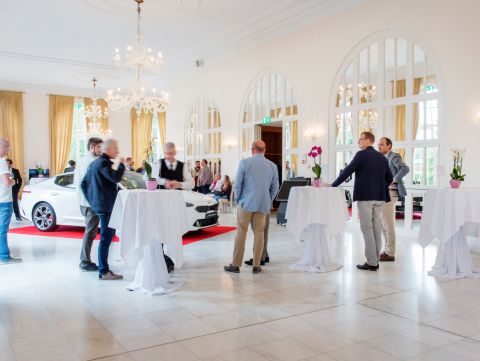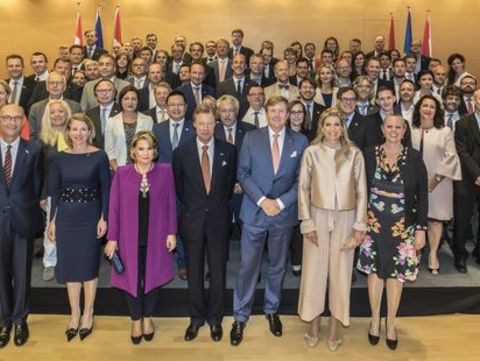The Future of Events: Charting a Path Forward
Despite taking a big hit during the Covid-19 pandemic, the business events sector is drawing upon its expertise and creative spirit to chart a path forward. That was the topic of ‘What will be the Future of Events?’, a panel discussion that took place at the European Convention Center Luxembourg on 2 November.
The discussion was part of the 59th ICCA Congress 2020, for which Luxembourg served as regional co-host. The panel comprised four industry experts, and the format itself showed how future congresses and conventions might take place. Two of the speakers and the moderator appeared digitally, while the other two speakers were present on stage.
Moderator Ben Goedegebuure, a vice president at Maritz Global Events, says that while preparing for the future feels to many like ‘looking into a crystal ball’, a better analogy is gazing at a steel ball and seeing your own reflection, because the industry is able to shape its own future.
Already ahead of the Game
While the sector is currently marked by a shift towards more digitalisation and hybrid events, the panelists agree that this change began long before the pandemic disrupted the industry. Sarah Skavron, a project manager at the German Convention Bureau (GCB), joined virtually. She says that preparation for the change goes back many years, citing ‘Meetings and Conventions 2030’, an influential 2013 study which identified hybrid and multi-site events as a key feature of the sector in the future.
The concept has undergone a successful test run, she says, with BOCOM, the ‘Experience Borderless Communication in the Digital Age’ meeting that took place in September. The central hub was in Berlin, while several other hubs were located around the world. Participants could attend in person or virtually, an example of this being that two people on a stage in Berlin were interviewed by someone in Amsterdam, while other speakers participated remotely.
Matthias Schultze, Managing Director of the GCB, virtually joined the discussion as well. He emphasised the importance this ‘new mindset’ that sees the audience as much more empowered. Delegates will be able to more easily choose to go in person to an event or attend as a virtual audience member.
Live Events: Still Safe and Here to Stay
Another vision of the post-pandemic events landscape was offered by Tara Cullen, a communications officer at Luxexpo the Box, located in the Kirchberg area of Luxembourg City. She says that in June, facing a major loss of turnover, she and her colleagues decided that ‘standing still wasn’t an option.’ As one of the largest events organisers in the region, they wanted to lead by example.
Drawing upon guidance from ICCA as well as experts, Luxexpo the Box created a business continuity guide with 26 health and safety measures for the Back Together! campaign. Also, aided by interior designer Mélanie Trinkwell, they created new meeting spaces to make people feel cozy and safe.
Luxexpo the Box also wanted to demonstrate how events that are ‘safe but sensational’ could be organised, and they wanted to offer something fun and free to the public, so they decided to host an open-air event in August. The result was Box Street Market, which brought together in a very safe manner dozens of vendors and live DJ music. During the two-day event, 10,279 people attended – proof that physical events can still be safe, fun, and rewarding.
The key, says Ms Cullen, is to ‘plan meticulously’ and ‘innovate spectacularly’. Of utmost importance is providing extensive health and safety measures that are visible but not overwhelming. For the team at Luxexpo the Box, this meant less signage but more trained personnel to guide visitors.
Dedication and Flexibility: the Keys to Success
Panelist James Debos, Director General of Eventime and PG Organisation, agrees that it’s vital to keep the human element at the forefront of planning. ‘We talk about data and technology, but one of the biggest issues we’re facing is human resources,’ he said while on stage at the discussion. ‘The biggest issue is psychological.’
Mr James says that having a motivated, dedicated team – confident and capable of dealing with situations that are constantly changing – is vital. Nowadays, he says, a congress organiser needs to also be a TV producer and filmmaker. While once upon a time the key to a successful event was content, now it’s ‘format, format, format,’ which keeps project managers on their feet.
The panelists say that flexibility, open-mindedness, and the willingness to expand business models are necessary for success in this new era. Also, all the panelists agree that in some ways, the pandemic is changing the industry for the better by increasing accessibility, giving more and better opportunities for those who might not be able to attend events in person due to familial, professional, or time constraints.
Key Points
- The shift toward more digitalization will actually empower audiences to participate in events in a way that suits them.
- The events industry has been preparing for more digitalization and hybrid events for years and is already transforming itself.
- Physical gatherings can still be a mainstay of events, and with the right planning and creativity, they can be safe and spectacular.





